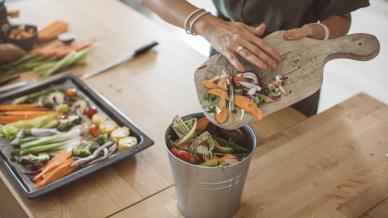Did you know that the UK is the highest producer of food waste in Europe? According to Business Waste, we throw away a shocking 9.5 million tonnes of food waste each year. That number includes wastage in the food industry, in the workplace and at home. Read below for more UK food waste statistics and tips for reducing your wastage.
UK food wastage: what are the five most wasted foods in the country?
- Bread
- Milk
- Potatoes
- Cheese
- Apples
When asked what we could do to reduce food wastage, Mark has two answers. First, learn how to store your food better and, second, diversify your cooking.
Mark and Hubbub have been working with the big supermarkets to raise awareness of how you can store foods better. Simple food waste reduction tips, known by many are surprisingly unknown by others.
A few food waste reduction tips:
- Keep bananas separate from other fruit to keep it from ripening too quickly. Banana stands aren’t just for looks, but to make this happen (we always wondered).
- Store salad in its original packaging in the fridge.
- Store basil for longer by keeping leaves out of the fridge so they don’t go black.
- Buy whole spices and grind them when you need them to keep them fresh.
But also, don’t clutter your fridge with onions – they keep better in a cupboard. If you have simple tips like these, don’t assume everyone knows. Make it a priority to share them – and we will get those food waste statistics down.
We should also popularize the art of preserving food. Many MasterChef contestants have shown that pickled food goes beyond beetroot and cheddar sandwiches, thanks to the addition of pickled radish.
Not only is it delicious, but it will also keep for longer and help to reduce food waste. But how many people know how to pickle? One to google if you don’t…
We can learn a lot from different cultures about different ways of preserving food. While Nordic and Asian countries may choose salt and spices, Italian's opt to preserve their peppers, tomatoes and artichokes in oils.
Variety is the spice of life
If you aim to waste less food, buying less can be part of the answer. However, supermarkets often package their food in portions too large for us to use or to keep prices low. If this is a problem, why not batch cook meals on Sunday and freeze them for later? Many meals such as pasta sauces, chilli and Bolognese work well, for example.
Another option is using different spices to add some variation - especially if you're using the same ingredients. Cumin, coriander or simple curry powders work wonders.
Herbs work well too. You could even keep some herbs on your windowsill to add a new flavour. Thyme, chives, basil or rosemary are great for this.
But, Mark wants us to go further than this. He suggests eating seasonally. As well as keeping costs down it is also more environmentally friendly. Just look where your green beans and strawberries are coming from.
Think of the air miles required to get your food to you. As well as that, the energy for heating the glass houses, plus the packaging. Find info on food wastage facts and more here.
You can discover more about Hubbub here www.hubbub.org.uk or, contact Mark on www.seasonalkitchen.co.uk
















